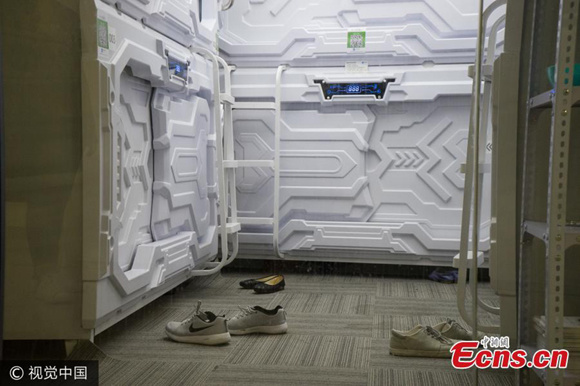
Shoes of users are seen near sleep capsules in the business incubator area of Haidian District, Beijing, July 9, 2017. (Photo/VCG)
(ECNS) -- Following shared bikes, shared umbrellas and shared chargers, the sharing economy has welcomed a new player: sleep cabins, in some cities, although its future looks uncertain.
A sleep-sharing set-up in Beijing's Zhongguancun area of Haidian district had become a hot topic of conversation. Located in an underground basement floor of a building, the room occupied 10 square meters and contained six self-service sleeping capsules.
Users could access a cabin by scanning a QR code and paying the bill to rent the space through an app, similar to those used by bike-sharing services. A set of disposable bed linens was provided to the user upon entry, which included a blanket, a bed sheet, a pillowcase and some wet tissues.
In addition, each cabin was equipped with a pair of earphones, an electric fan, a mirror and power interfaces. The door of the cabin could be locked from the inside to protect the privacy of its user.
The cost to rent a sleeping cabin differed depending on the time of day. During peak hours, from 11 a.m. to 2 p.m., it costs 20 yuan ($4.4) per hour, and at other times the charge is 12 yuan per hour, to a maximum charge of 58 yuan each day. A monthly access card is also available at a cost of 788 yuan.
The creator of the project told Chinese media that the sleeping cabins were fully occupied in the afternoons, adding that "they were also occupied by people that worked night shifts."
Some 16 shared sleeping sites were in operation across Beijing, the spokesperson said, and the service would operate in other Chinese cities including Shanghai and Chengdu.
"The sleeping cabins are quite useful,"one user said. But some users said the prices for noontime snooze are a little high.
Others complained that the rooms could be stuffy and needed better sound insulation. Impermeability caused problems of poor ventilation, a reporter at Beijing Youth Daily said after having an experience.
Not everyone agreed that the sleeping cabins should be compared to other sharing services, however. The sleeping rooms were more comparable to hotels that could be rented by the hour and did not fall into the sharing economy at all, experts said.
"Sleeping is a private thing that you cannot share with others," said analyist Fu Liang.
The latest development is that the sleeping cabins in Zhongguancun were closed by police, according to its operator, giving no details.


















































